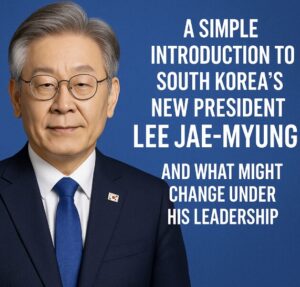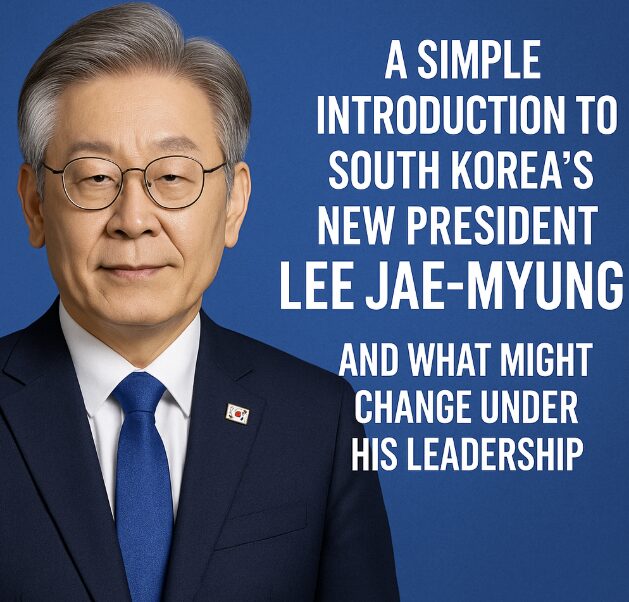South Korea has officially entered a new political era with Lee Jae-myung taking office as the 14th President of the Republic. Following years of political tension and polarization, President Lee’s election marks a significant shift in the country’s leadership and policy direction. Whether you’re someone interested in Korean politics, the economy of East Asia, or planning to travel or do business in Korea, it’s worth understanding who Lee Jae-myung is and what his presidency could mean for South Korea’s future.

Who Is Lee Jae-myung?
Lee Jae-myung’s personal story is one of resilience. Born in 1964 in a poor village in Andong, his childhood was marked by hardship. He worked in factories as a teenager and suffered an injury that left him with partial disability in one arm. Despite this, he worked his way up, studying law and eventually becoming a human rights attorney. His legal career focused on helping workers and advocating for social justice.
Before becoming president, Lee served as the mayor of Seongnam and later as governor of Gyeonggi Province, South Korea’s most populous region. During his time as governor, he gained national attention for his bold and sometimes unconventional policies, including basic income experiments and aggressive COVID-19 response measures. His style has always been outspoken, sometimes controversial, but often praised for being focused on action over words.
Why Did South Koreans Elect Lee Jae-myung?
Lee’s victory came in the wake of a turbulent political period. Former President Yoon Suk-yeol’s administration was marred by rising discontent, especially among younger voters and progressive communities. Issues such as widening inequality, youth unemployment, and perceived threats to democratic institutions led to protests and a growing desire for change.
Many saw Lee Jae-myung as a figure who could challenge traditional political elites and stand up for ordinary citizens. He campaigned on a message of justice, fairness, and economic transformation. Young women in particular were among his strongest supporters, especially after Lee spoke out against the rollback of gender equality protections under the previous administration.
Economic Changes You Can Expect Under Lee Jae-myung
President Lee takes office at a time when South Korea’s economy is facing serious challenges. These include a slowing growth rate, high household debt, inflation, and rising costs of living. To address these, Lee has announced a large-scale stimulus plan—reportedly worth around 30 trillion won (approximately $22 billion USD)—to jumpstart the economy.
Key economic priorities under Lee include:
Supporting small businesses rather than just large corporations
Promoting innovation in green energy and artificial intelligence
Expanding public investment and infrastructure
Creating jobs, particularly for young people
Offering universal basic income (UBI) to some groups like youth and farmers
While the idea of UBI remains controversial, Lee believes that a more balanced economic model—one that supports both growth and redistribution—is essential for long-term stability. He also wants to reform the financial system by making loans more accessible and limiting speculative real estate investments that have driven housing prices up.
What About Public Opinion and Democracy?
Lee’s presidency follows a moment of serious political division in South Korea. Just before his election, the country experienced intense public protests against efforts to expand state control and undermine democratic institutions. In fact, former President Yoon was removed from office partly due to reports that his government had considered enacting martial law.
Against this backdrop, Lee has promised to restore democratic norms and protect civil liberties. He emphasizes transparency, anti-corruption measures, and more direct communication between the government and the people. In his first days in office, he has already moved to reorganize the presidential office and hold more public briefings.
Many South Koreans hope that Lee will bring stability and fairness back to politics. Others remain skeptical, especially conservative voters who fear higher taxes or left-leaning reforms. Still, Lee’s first approval ratings suggest cautious optimism among the majority of citizens.
Foreign Policy: Balancing Allies and Regional Security
Lee Jae-myung’s foreign policy is expected to be pragmatic rather than ideological. He supports strong relationships with traditional allies like the United States and Japan, while also seeking more diplomatic and economic cooperation with China. With North Korea, he has indicated openness to talks—but only if certain conditions are met, particularly around denuclearization.
He is also interested in strengthening South Korea’s voice in global matters such as climate change, tech cooperation, and international trade. With ongoing geopolitical tensions in the Asia-Pacific region, Lee’s ability to navigate between global powers will be a key part of his leadership.
Social Policy and Youth Support
South Korea’s younger generations have faced increasing stress over job security, high housing prices, and rigid social expectations. President Lee has spoken directly to these issues by proposing policies such as:
Expanding housing availability through public rentals
Reforming the education system to reduce pressure
Improving work-life balance policies for both men and women
Offering direct cash support (basic income) to young job seekers
Gender issues have also been at the center of national debate. Under the previous administration, many women felt sidelined. Lee has pledged to protect gender equality and expand policies that support women in the workforce and leadership roles.
What Lee Jae-myung’s Presidency Means for South Korea’s Future
In many ways, Lee Jae-myung represents a break from tradition. His rise from poverty, his direct style, and his progressive policies have made him a symbol of change. At the same time, he faces real challenges: stabilizing the economy, rebuilding trust in government, and managing both domestic and international expectations.
For foreigners interested in Korea—whether as travelers, investors, students, or expats—Lee’s presidency may bring greater social openness, more public services, and a renewed focus on fairness and innovation.
Time will tell how much Lee can achieve, but one thing is clear: his leadership marks a bold new direction for South Korea in 2025 and beyond.
